Can pregnant women get dental fillings? A dental guide for pregnant and breastfeeding mothers. Some pregnant women often experience dental problems due to hormonal changes and calcium deficiency in the body.
This can hinder the pregnancy process and cause inconvenience in daily life. During pregnancy, tooth decay in pregnant women can increase the risk of preterm birth. bTo answer all these questions, let’s explore the detailed information below with BeDental Dental Clinic!
Why are pregnant women prone to dental problems?
Why are pregnant women prone to dental problems? Regular dental check-ups are crucial for everyone, especially for pregnant women.
During pregnancy, the body undergoes changes in hormones such as progesterone and estrogen, which increase compared to normal levels. This intensifies blood circulation and brings more blood to the gums and oral cavity.
As a result, the gums may become swollen and more prone to react with bacteria present in the oral cavity, leading to the accumulation of dental plaque. Can pregnant women get dental fillings to manage the effects of such conditions?
Along with these hormonal changes, the calcium level in the body decreases significantly. Calcium is essential for maintaining strong and healthy teeth, and the constant fluctuations during pregnancy make it challenging to provide sufficient nutrients for dental health.
Therefore, the body may be more susceptible to various dental problems due to the inadequate supply of nutrients. Can pregnant women get dental fillings if these issues worsen?
In normal circumstances, a woman’s body can meet the oral health needs without noticeable effects. However, for women with low calcium levels or decreased calcium levels, the deficiency becomes more evident during pregnancy, leading to tooth decay, gum inflammation, and bleeding gums.
See more: Choosing between dental fillings for tooth erosion or dental crowns
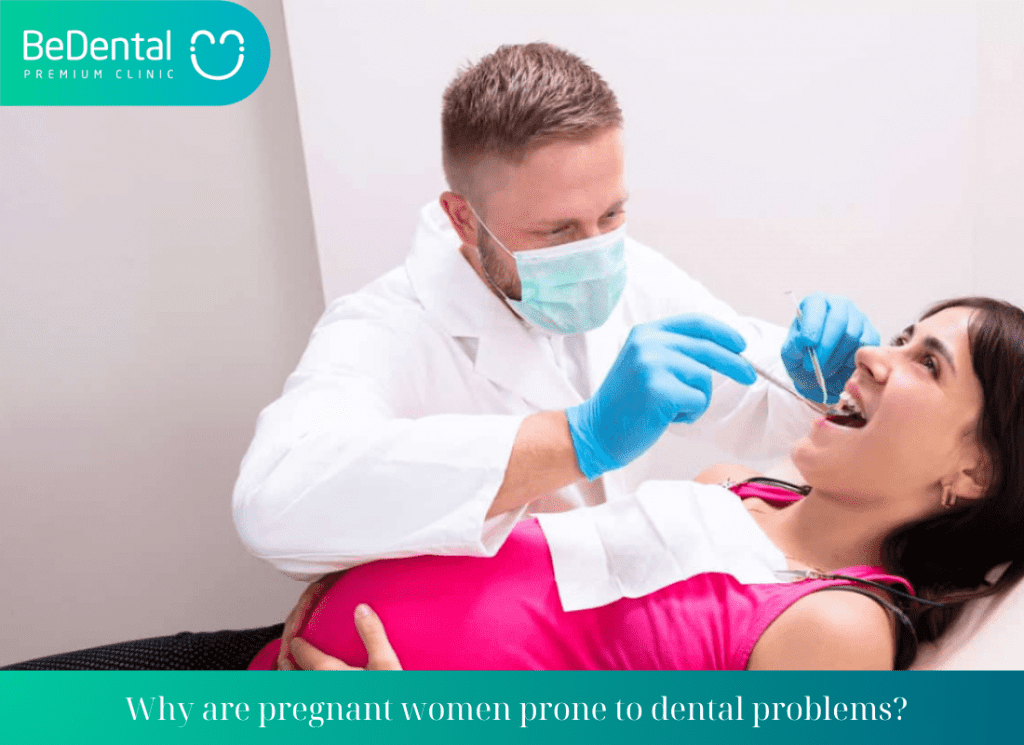
In addition, a common issue during pregnancy for expectant mothers is dry mouth and lips. During pregnancy, the saliva production decreases significantly, and saliva is one of the main components that strengthen the tooth enamel and effectively eliminate the risk of cavities.
Therefore, when saliva production decreases, the risk of cavities for pregnant women also significantly increases. Can pregnant women get dental fillings to prevent these from progressing further?
Throughout the pregnancy process, any infection that a mother contracts in any part of her body poses potential risks for both the mother and the baby. If there is no proper treatment, it can have a negative impact on the fetus, and the risk of preterm birth is significantly higher. The baby’s overall health may also be compromised compared to normal circumstances.
Can pregnant women get dental fillings?
Can dental fillings be done during pregnancy? Pregnant women, especially during the first three months of pregnancy, should minimize any interventions or external impacts on their bodies to ensure the healthy and safe development of the fetus. However, can pregnant women get dental fillings when the situation becomes urgent?
During pregnancy, the woman’s body is in a sensitive stage, and any carelessness can have a negative impact on the health of the baby, leading to unforeseen dangers for both the mother and the baby.
However, in some cases, it is necessary for pregnant women to get dental fillings to ensure oral health for both the mother and the baby, especially when there are cavities. Dental fillings are a simple dental procedure that can be done quickly and without the use of strong anesthetics or painkillers, so pregnant women can still undergo dental fillings following the dentist’s instructions.
So, if you are wondering can pregnant women get dental fillings, you can directly consult with a specialized dentist for examination and timely treatment. It is important not to let the illness prolong and worsen, as it can pose a threat to the health of both the mother and the baby.
See more: 8 New Trends in Dental Treatment: Advanced Technology and Techniques
The appropriate stage for pregnant women to get dental fillings
Can pregnant women get dental fillings at 3 months pregnant? Can pregnant women get dental fillings at 4 months pregnant? can pregnant women get dental fillings at 5 months pregnant? These are questions regarding the suitable timing for dental fillings during pregnancy. Can pregnant women get dental fillings during these stages safely?
As mentioned above, pregnant women can undergo dental check-ups, but not every stage of pregnancy is suitable for dental fillings. Choosing the appropriate timing for dental fillings is extremely important to ensure a safe, scientific, and effective process.
Specifically, dental experts recommend that the ideal timing for pregnant women to get dental fillings is between 4 to 7 months of pregnancy. This is the time when the baby in the womb has developed its body in the most stable state and has adapted well to the mother’s body. Therefore, the mother can tolerate minor impacts on the oral cavity.
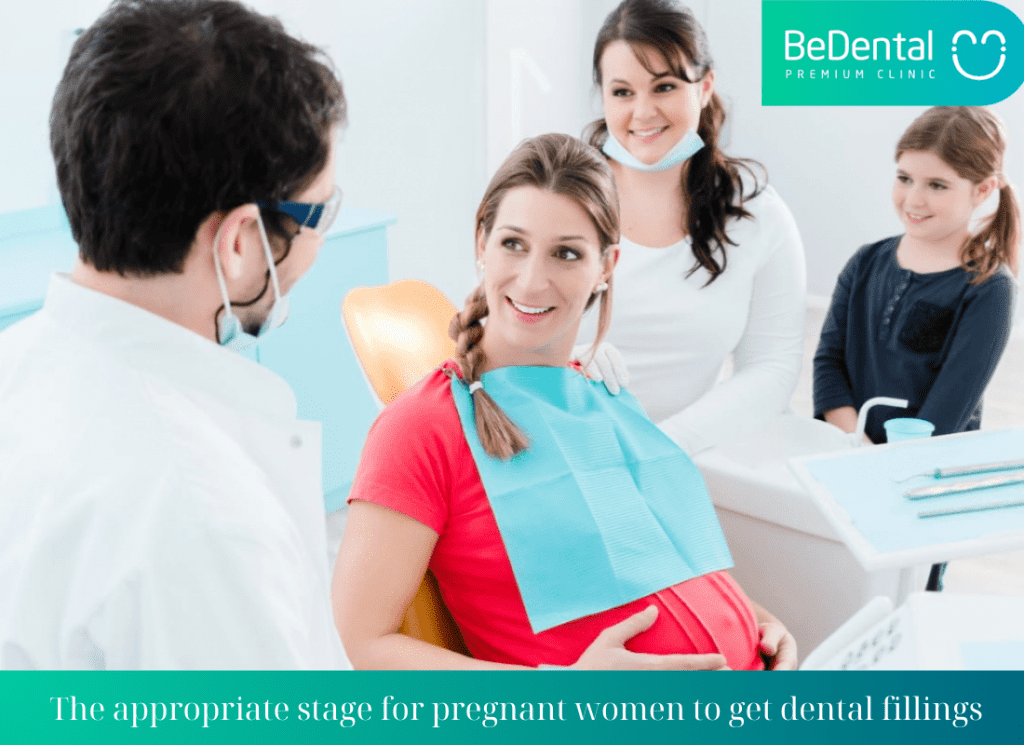
For the first 3 months, pregnant women are experiencing frequent morning sickness, and during this time, the fetus is still in the early stages of development, so it is not suitable for dental fillings.
In the last 2 months of pregnancy, the abdomen is quite large, making it uncomfortable for pregnant women to move or lie in one position for a long time, which is not good for the baby and can make the mother uncomfortable and affect her current health. Still, can pregnant women get dental fillings safely during this time if truly necessary?
Are dental filling materials safe during pregnancy?
Are dental filling materials safe during pregnancy? Currently, there are two common and safe dental filling materials that many people trust to use, which are Amalgam and Composite fillings. Can pregnant women get dental fillings with these materials safely?Each type has its own advantages and limitations. To understand more, please read the information below:
For Composite fillings, the biggest advantage is its aesthetic appearance, it is safe, but it is limited in terms of durability. Therefore, Composite fillings are usually used for front teeth.
On the other hand, Amalgam fillings have the ability to withstand pressure and have a longer lifespan, but they have lower aesthetic quality, so they are often used for back teeth. In addition, Amalgam contains a combination of different metals, which can be harmful to the health of pregnant women, which is a disadvantage of Amalgam.
Can pregnant women get dental fillings after proper consultation? Absolutely.
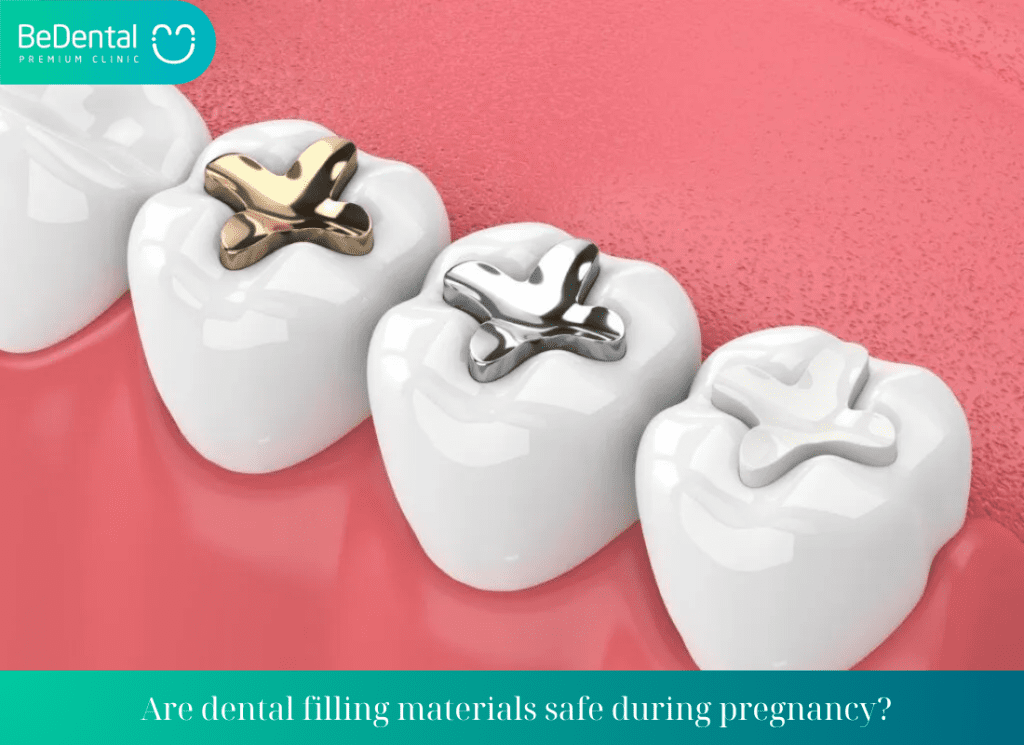
In addition, pregnant women can use the advanced Laser Tech dental filling method, which uses laser beams to harden the filling material, helping the filling to quickly adhere tightly to the affected areas without causing discomfort, sensitivity, or pain.
This technology not only ensures aesthetics but also provides optimal durability. The dental filling procedure is quick and the results last longer compared to traditional dental filling techniques. Can pregnant women get dental fillings using Laser Tech? Yes, and it’s considered very safe.
Does dental filling affect the health of the baby in the womb?
Dental filling is a dental technique that uses artificial materials to fill in damaged, deep, cracked, or broken parts of the teeth, protecting them from external impacts and preventing the invasion of bacteria that can cause tooth decay.
The dental filling method does not require X-ray imaging and does not involve the use of medications, so dental filling does not have any impact on the health of the fetus.
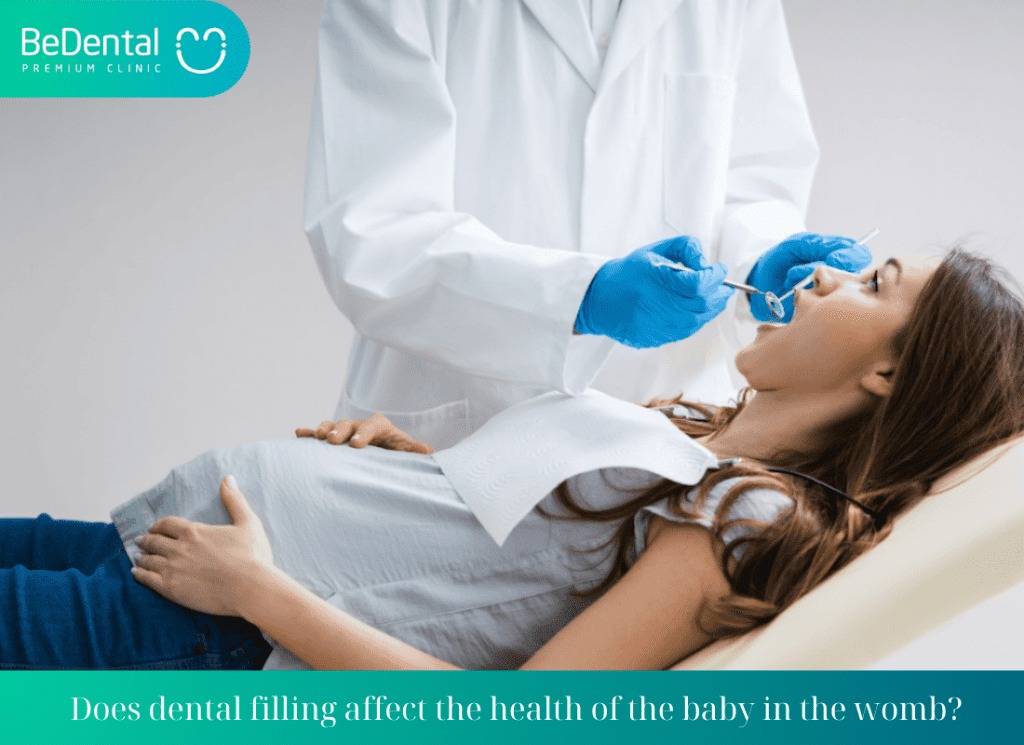
Dental filling can be applied to pregnant women and women who are breastfeeding. However, it is still better for pregnant women to choose the appropriate time to undergo dental filling in order to minimize any negative effects on the fetus.
It is important to consider the specific characteristics of each stage of pregnancy to determine the exact timing for dental filling. Dental filling should only be performed with the permission and recommendation of a specialized obstetrician and dentist.
Pregnant women who undergo dental filling should take note of the following:
During pregnancy or while breastfeeding, it is crucial for mothers to pay attention to dental services in order to maintain good oral health and ensure the safety of breast milk, which provides essential nutrients for the fetus’s development in the womb.
The mother’s body is already providing enough nutrients to nourish the body, but it is still important to maintain good oral health. For example, pregnant women should consume foods and beverages rich in calcium, iron, minerals, and fiber to promote the overall development of the body and oral health.
Oral Care Regimen
After dental filling, you need to pay attention to your oral care to achieve the most effective and best results. Can pregnant women get dental fillings and maintain them well? Yes—with the right care.
- Gently brush your teeth and clean your mouth at least twice a day, simply by brushing your teeth in the morning and before bed. Can pregnant women get dental fillings and use fluoride toothpaste safely? In most cases, yes.
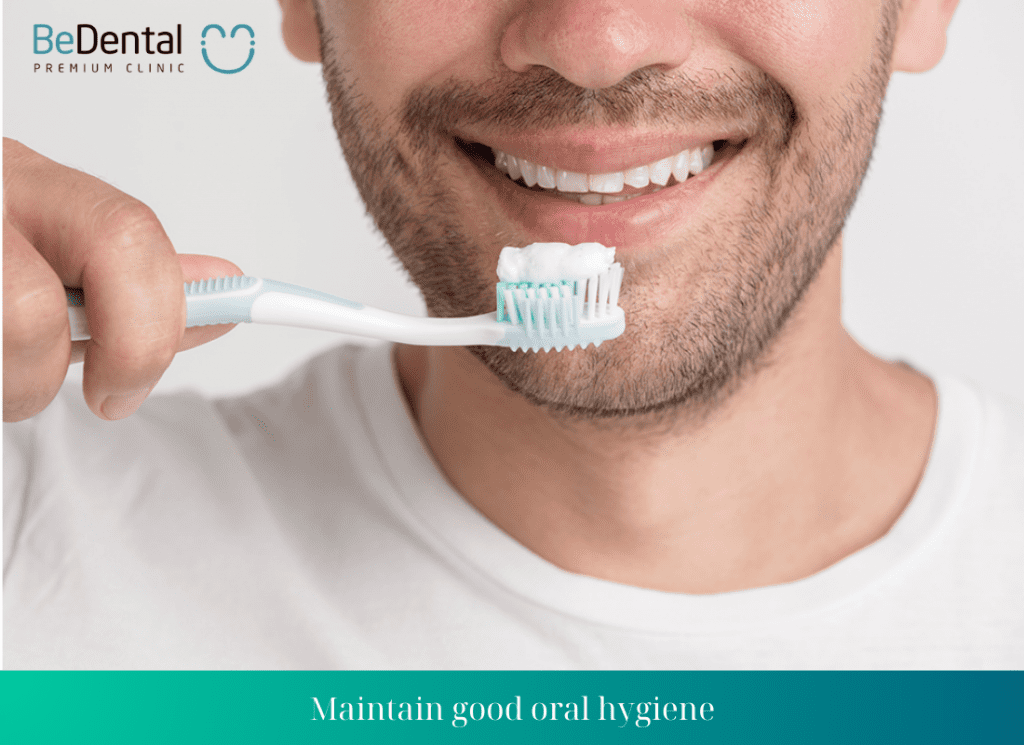
- Use a toothbrush with soft bristles, and be mindful of using moderate pressure to avoid wearing down the tooth enamel and causing the newly filled area to shift.
- Do not use toothpicks or other sharp objects on your teeth; instead, use dental floss to avoid damaging the dental filling material and causing the teeth to become wider over time.
- Rinse your mouth after meals, especially after consuming foods that are not good for your teeth, in order to protect your teeth and prevent tooth decay. If it is not convenient to rinse your mouth immediately, you can drink plenty of filtered water to flush out any remaining food particles in and around the teeth.
- After dental filling, you may experience sensitivity and difficulty eating extremely hot or cold foods. If this condition persists, you should revisit the dental clinic for a more thorough examination of your current oral health and receive specific treatment recommendations from the dentist.
- Use saltwater or diluted saltwater, antibacterial mouthwash, or warm water for daily mouth rinsing. This helps effectively kill bacteria in the oral cavity and teeth.
Choose modern dental filling techniques that are safe for your health.
The body of a pregnant woman is sensitive and needs to ensure the safety of both the mother’s and the baby’s oral health. Therefore, dental filling techniques need to be carefully chosen and highly effective.
See more: How much does a root canal cost?
Choose materials and methods that have good durability and firmly adhere to the filling. At the same time, ensure a natural appearance that closely matches the color of the natural teeth to enhance the aesthetic appearance of the entire mouth and not be easily noticeable to the naked eye.
In addition, the dental filling material should be able to withstand strong forces and allow for eating and chewing almost like normal teeth after filling, without any restrictions.
The dental filling material and technology must be suitable for the customer’s and the pregnant mother’s oral health.
Guide to oral health care for pregnant women or those breastfeeding
During pregnancy, women often experience oral health issues primarily due to the following two reasons:
Firstly, the teeth and gums of pregnant women are at risk of weakening due to hormonal changes in the body. Therefore, they are prone to gum inflammation with symptoms such as pain, bleeding, and sometimes gum recession.
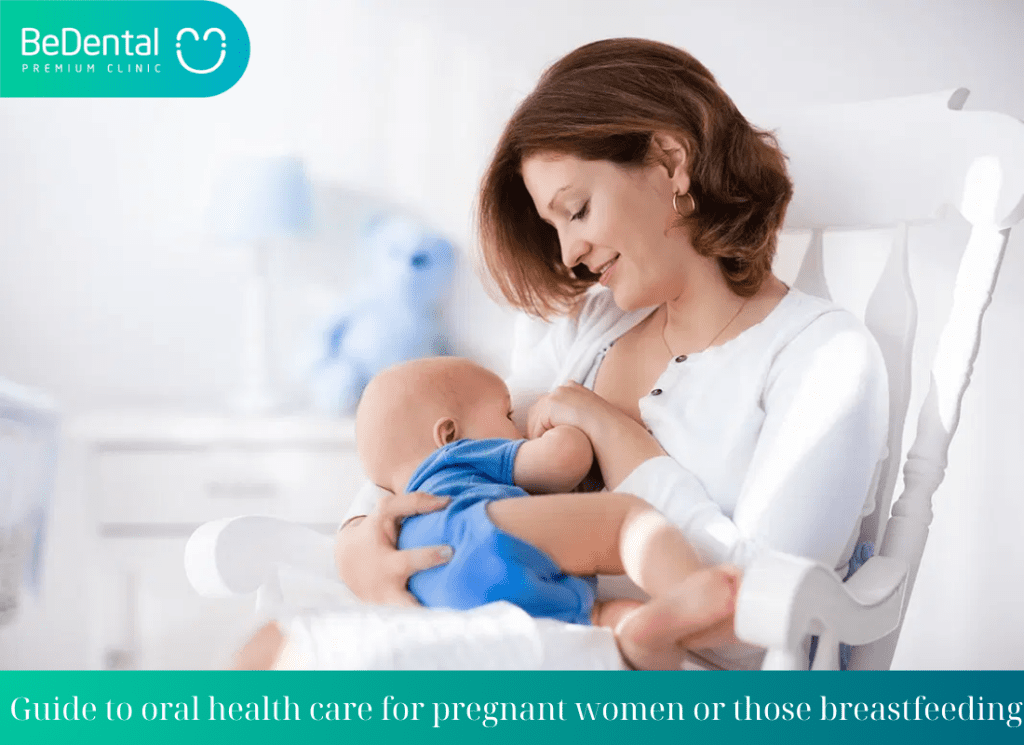
The second reason is the changes in the pregnant woman’s diet. Pregnant women often experience nausea and vomiting, leading to changes in their eating habits. They also have a tendency to consume more acidic and sugary foods, which increases the risk of tooth decay.
According to dental experts, pregnant women with oral health problems have a high risk of premature birth. According to a study at the University of Alabama, USA, the number of premature births can be reduced by up to 84% by treating periodontal disease (gum disease) in pregnant women.
Chew food on the opposite side of the filling
For example, if you have a deep filling on the left side, chew food on the right side. Do this during the first week to ensure the filling is completely set.
Eat soft, nutritious foods
Maintain a healthy diet with plenty of protein from fruits and vegetables, which will benefit your overall health as well as your oral health.
See more: Bleeding gums and 9 ways to cure at home
Proper oral hygiene
Proper care after filling includes:
- Brush your teeth at least twice a day, in the morning and evening.
- Use a soft-bristled toothbrush with a small head and gentle pressure. Tilt the brush at a 45-degree angle and avoid excessive contact with the newly filled area.
- Use fluoride toothpaste to prevent tooth decay.
- Use dental floss to remove plaque between teeth and prevent tooth decay and inflammation.
- Rinse your mouth with saltwater regularly after brushing.
Regular check-ups and cleanings at the dental clinic
Professional oral hygiene techniques will help you maintain clean and healthy teeth and prevent the filling from coming loose.
Additionally, early detection of cracked or broken teeth can lead to timely treatment.
Bedental – Trusted dental filling address
Nowadays, there are many dental clinics offering cosmetic filling services. However, not every clinic can successfully apply advanced Laser Tech filling technology, which ensures effective, safe, and long-lasting results.
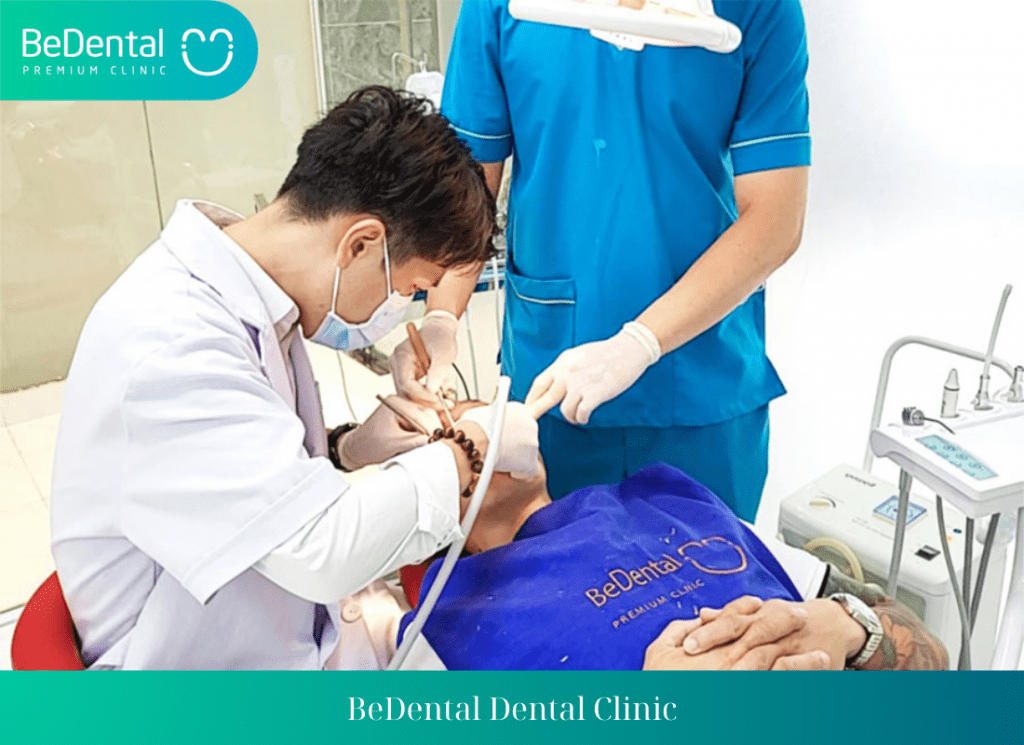
BeDental Dental Clinic is one of the rare addresses that successfully applies this modern technology, bringing thousands of new beautiful and healthier smiles. In addition to the advanced Laser Tech filling technology, the dental clinic also possesses many other factors that contribute to successful dental fillings for customers, such as:
- A team of highly skilled dentists with over 10 years of experience in the field of cosmetic dentistry and treatment of dental diseases.
- A nationwide network of clinics, each equipped with state-of-the-art facilities, machinery, and modern equipment to maximize support for dentists during the treatment process.
- The staff and dentists are always attentive and provide specific advice to customers before, during, and after treatment, helping you learn how to care for and protect your teeth, enhancing the durability of the fillings as much as possible.
You can refer to the price list at BeDental to find out the exact cost of this advanced dental filling technology compared to other methods.
| Danh mục | Unit | Giá thành | |
|---|---|---|---|
| 1.Teeth filling (More detail...) | |||
| Baby teeth filling | 1 Unit | 250.000 ~ 10$ |
|
| Permanent Teeth Filling | 1 Unit | 500.000 ~ 20$ |
|
Cosmetic Filling | 1 Unit | 700.000 ~ 28$ |
|
Sensitive teeth filling | 1 Unit | 500.000 ~ 20$ |
|
| Composite bonding | 1 Unit | 1.000.000 ~ 40$ |
|
| 2.Root Canal Treatment - Anterior by endodontist machine (More detail...) | |||
| Root Canal Treatment - Anterior for baby teeth | 1 Unit | 1.200.000 ~ 46$ |
|
| Root Canal Treatment - Anterior for Front teeth | 1 Unit | 1.800.000 ~ 60$ |
|
| Root Canal Treatment - Anterior for Premolar teeth | 1 Unit | 2.500.000 ~ 95$ |
|
| Root Canal Treatment - Anterior for molar teeth | 1 Unit | 2.500.000 ~ 95$ |
|
| 3.Root Canal reTreatment - Anterior by endodontist machine | |||
| Root Canal Treatment - Anterior for Front teeth by endodontist machine | 1 Unit | 2.000.000 ~ 70$ |
|
| Anterior for Premolar teeth by endodontist machine | 1 Unit | 2.500.000 ~ 95$ |
|
| Anterior for molar teeth by endodontist machine | 1 Unit | 3.000.000 ~ 110$ |
|
| 4 Vecniflour dental care (More detail...) | |||
| Vecniflour dental care for child | 1 Unit | 500.000 ~ 20$ |
Tư vấn chuyên môn bài viết:
BÁC SĨ DƯƠNG THỊ THÙY NGA
BEDENTAL - TOP STANDARD DENTISTRY SYSTEM
In HANOI
Address 1: 7B Thi Sach St, Ngo Thi Nham, Hai Ba Trung Dist, Ha Noi. - 0934.61.9090
Address 2: No 129 Hoang Ngan, Yen Hoa, Cau Giay Dist, Ha Noi. - 0934.61.9090
In HO CHI MINH
Address 1: 53 -55 -57 Pho Duc Chinh St, Nguyen Thai Binh, Dist. 1, Ho Chi Minh. - 0766.00.8080
Working: 9am - 8pm everyday
Website: https://bedental.vn/en/
PLEASE LEAVE YOUR INFORMATION IF YOU WANT DENTAL CONSULTATION





